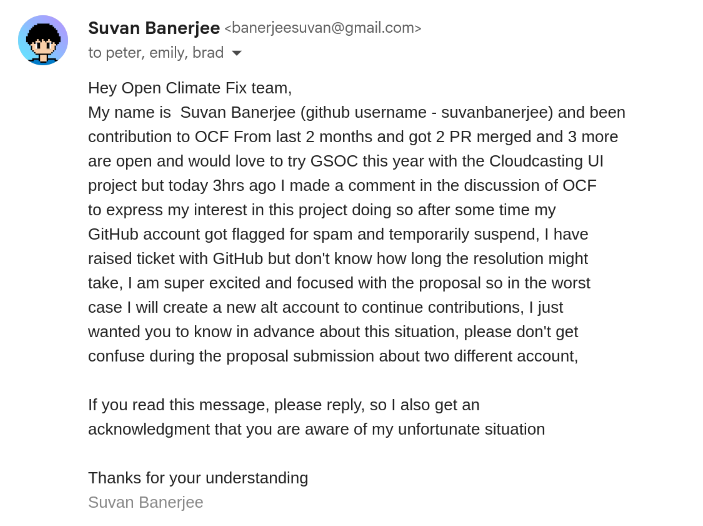
PS: The clouds image is because my project mainly deals with clouds :P
My Google Summer of Code 2025 Journey
How It All Started
For me, Google Summer of Code began around November 2024. My awesome seniors from Point Blank encouraged us all to start contributing to open source projects and apply for GSoC. Initially, I was lazy and didn’t do anything until January 2025.
Choosing the Right Organization
If you're applying for GSoC, consider organizations that resonate with your values and interests not just tech stacks or roles. For example, if you're a web developer, don’t limit yourself to HTML/CSS/JS or only frontend projects. Look for organizations working on things you truly care about.
For me, that meant tech for good and climate action. I wanted to work on something that could genuinely make a difference in the world. That’s when I stumbled upon Open Climate Fix (OCF).
I managed to get 3–4 PRs merged before the application deadline. I was primarily a web developer, while OCF focuses heavily on AI/ML. Still, I never thought, “Wait, I don’t do AI/ML, so I shouldn’t apply.” Instead, I focused on what I could control: writing an honest proposal and giving it my best shot.
Luckily, in 2025, OCF had one web dev project and I got selected for it :)
The application process was intense. Over 200 people applied to OCF, and only 6 were selected. Some applicants were from top colleges, had stronger resumes, and better experience. But I focused on being consistent and delivering quality contributions.
Getting that acceptance email in May 2025 was surreal. All those late nights studying geography, learning about clouds and ML models it all paid off.
The Night I’ll Never Forget
On the day of the GSoC organization announcements, all of us at Point Blank arranged a night out in the college lab 4 cans of Red Bull and a lot of Lays. We just sat down and analyzed the GSoC 2025 org list.
I was happy to see OCF on the list. That night, I made some comments and PRs (Red Bull does give wings :P). But just as I was about to sleep at 7:00 AM, my GitHub account got banned.
I was like, what the hell is happening?! Apparently, because of my hyperactivity that night, GitHub flagged me as a bot. I emailed the maintainers, explained the situation that was actually my first official message to OCF (though I didn’t get a reply 😂).
Still, from getting banned to getting selected for GSoC 2025 it was a complete emotional rollercoaster.

The Coding Period: Building Cloudcasting UI
In the beginning, I was really worried and underconfident. I kept asking myself will I be able to complete the project? But my mentor was super supportive and helpful.
If you ever feel you're not good enough believe me, all of us have been there. The key is to keep learning, keep trying, and ask for help early and often.
One moment I recall vividly I was trying to convert satellite data into COG TIFFs, but the output looked completely wrong. I couldn’t figure out why. I asked my mentor, and Brad passed the code to another mentor for a review and it turned out to be a freaking calibration value.
Lesson learned: asking for help isn't a weakness it's a strength and a sign of willingness to learn.
Here’s a sneak peek into what I used to play with during the coding period :)
What GSoC at OCF Taught Me
To be honest, I didn’t gain a ton of coding knowledge but I did learn how to write code that scales, is readable, tested, and maintainable.
I learned how to document code clearly, structure projects so others can contribute easily, and how to work with mentors across different time zones. I also learned a bunch of random trivia about London and the UK thanks Brad :P
Beyond the Code: What I Really Gained from GSoC
While many treat GSoC as just another internship, I realized that its value goes way beyond tasks and stipends (though yes, the stipend helps as a student!).
The technical growth was huge. Working on the Cloudcasting UI project pushed me to explore topics I never imagined like geography, cloud patterns, satellite data, and geoprojections.
Even beyond tech, I learned a lot about project management, cross-time-zone communication, and how to pitch and defend ideas in technical discussions. I learned how to balance feature requests with constraints and gained confidence in presenting my work to stakeholders.
The stipend helps, but the professional network and skills you build during GSoC open doors that stay open long after the program ends.
To Future GSoC Aspirants
If you're thinking about applying for GSoC do it.
Not just for your resume or the stipend, but for the growth. It's truly one of the most transformative experiences you can have as a developer.
Start early. Pick orgs whose missions align with your values. Contribute meaningfully. Ask questions. Share ideas. And remember your unique perspective might be exactly what a project needs.
The “Congratulations, you’ve been selected for GSoC 2025!” email will make every bit of the journey worth it.
If you have any questions about GSoC or open source in general, feel free to reach out to me on any of my socials. I’d love to help and have a nice chat about it!